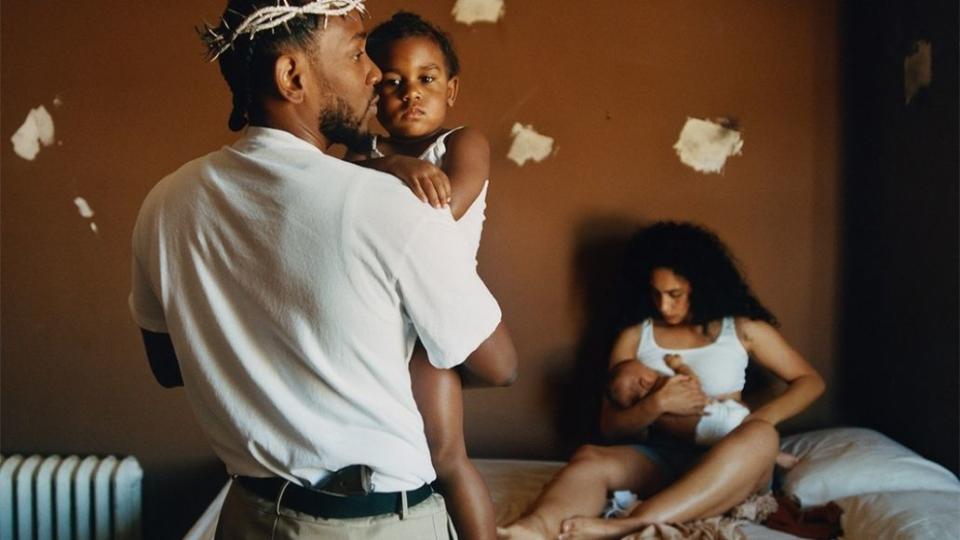With Mr. Morale & the Big Steppers, Kendrick Lamar Chooses Himself and Makes a Masterpiece
- Oops!Something went wrong.Please try again later.
The post With Mr. Morale & the Big Steppers, Kendrick Lamar Chooses Himself and Makes a Masterpiece appeared first on Consequence.
“I choose me, I’m sorry.”
The last five words on Kendrick Lamar‘s Mr. Morale & the Big Steppers hit the hardest for anyone who “did the work,” as trained and untrained therapists like to say. Kendrick’s fifth album, out today (May 13th), is a lot of things: part political analysis, part social critique, with a dash of familial observations. But from start to finish, it’s all therapy.
Kendrick’s latest effort is the Compton emcee putting himself on the couch and asking, “Why?” Why is he addicted to women and cheating? Why is he overwrought with guilt when he can’t help old friends? Why does he bathe in toxic relationships? Or even why he’s so damn competitive when it comes to rap?
Kendrick created a double LP sure to inspire tons of ink spillage from the pop culture industrial complex. And you know what? Every drop of said ink is worth it. Mr. Morale & the Big Steppers is another bonafide masterpiece from a cat who seemingly can’t miss when he steps in the booth. Through examining his own psyche, he cracks open the mind of those of us with melanin in our skin.
“United in Grief” starts side one with a voice imploring Kendrick to “tell them the truth.” He begins on a path detailing his insecurities, quirks, and flaws. After more than a decade, Kendrick is a deity to more than a few people who worship at his altar. But that’s not a position he wants to inhabit for even a few seconds of the day. The above song explains that he’s just as materialistic as the rappers whom we compare him to.
Meanwhile, “N95” details his problems with the masks we — and him — wear to hide our truth. “Worldwide Steppers” gets closer to his truth. He questions his motives for sleeping with white women back in the day while admonishing himself for a laundry list of issues. Whether it’s killing other people’s accomplishments, objectifying women, and leaving his old neighborhood as soon as the commas in his bank account made it feasible.
Within the album’s narrative, this is the moment Whitney, his longtime partner, suggests he seeks therapy. And for some, “therapy” is a four-letter word. Mr. Morale & the Big Steppers shows why Kendrick embraced the process and the evolution he experienced as a result.
While side one standouts like “Die Hard” and “Father Time” are indeed dope tracks, the highlight of the side, and the album, is “We Cry Together.” Kendrick and Taylour Paige play a couple going through all the emotions. Calling the relationship “toxic” feels like a disservice to toxic relationships.
The Alchemist-produced track charts the few highs and mostly lows of two people who need to do themselves — and the world — a favor by ending any association with each other. The most astounding aspect is that Taylour and Kendrick channel all that emotion that feels authentic while never forgetting it’s a rap song.
Typing the lyrics won’t do either artist or the song justice, but know this is an excellent exercise in emceeing. Every word is precise and blends perfectly with Uncle Al’s menacing beat. The cherry on top of the bitter sundae is that it fits the album’s theme. “We Cry Together” happens when two people who desperately need therapy ignore it for various reasons. Their union affects everyone around them, and if they have children, their kids bear the brunt of that toxicity. And then it spreads like mustard over an entire generation.
We’re all the results of our parents. What we do with that realization and whether we remain prisoners to our upbringing is on us. Kendrick acknowledges his “daddy issues” on “Father Time,” a title bubbling with double entendre. While chronicling the time spent with his father, he gives another tacit reminder of his newfound fatherhood: “Daddy issues, hid my emotions never expressed myself/ Men should never show feelings, being sensitive never helped/ His momma died I asked him why he goin’ back to work so soon/ His first replay was, ‘Son, that’s life, the bills got no silver spoon.”
Burying one’s emotions is learned behavior, and we rarely think about how it affects others. Those familial traits passed from his father to him even inspire his views on the rap game: “Daddy issues kept me competitive that’s a fact n***a/ I don’t give a fuck what the narrative, I am that n***a/ When Kanye got back with Drake, I was slightly confused/ Guess I’m not mature as I think, got some healin’ to do.”
While rap nerds and tea addicts will undoubtedly read a lot into those words, it has very little to do with Kanye or Drake. Kendrick takes himself to task for believing bygones are never bygone. He told us many moons ago on “Control” that he has no desire to break bread with any rapper after the beef settles.
Hip-hop isn’t in that space anymore, however. While Kendrick may pine for the days when rappers openly espoused the spirit of competition, he acknowledges his need to grow beyond such pettiness. Well, such open pettiness. Even owning something so small is a big step. Especially with the way he finishes the track: “And to my partners that figured it out without a father/ I salute you, may your blessings be natural to your toddlers/ It’s crucial, they can’t stop us if we the mistakes/’ Till then let’s give the women a break, grown men with daddy issues.”
One prominent point of contention within Black households is breaking free of the chains born from lifetimes of trauma. Kendrick’s music always danced around this theme. He fully embraces the idea with a python’s grip on this album.
Generational trauma is key to side two. Less about Kendrick blaming anyone for his problems but more about him understanding the importance of not passing them on to his babies. On “Count Me Out,” he accepts the insecurities he bemoaned on “Die Hard” because becoming a father truly changed his outlook on life. Like Nas scribbled on “The World is Yours,” Kendrick sees his kids as his “resurrection.” His second chance to correct past sins and transgressions. “I care too much wanna share too much/ I shut down I ain’t there too much/I’m a complex soul they layered me up/ Then broke me down, and morality’s dust/ I lack in trust.”
I don’t know who needs to hear that today, but those words are easy to feel for anyone who drowns swimming in their own misconceived thoughts. “Even my strong points couldn’t survive/ if I didn’t learn to love myself, forgive myself a hundred times.” That’s a tall task for any human who breathes oxygen, much less an artist living in a fishbowl.
But that’s probably one reason Kendrick takes time away. He cites writers’ block and a lack of inspiration early in the album. Still, side two reveals a weariness of trying to be everything to everyone. As I said, Kendrick isn’t interested in heroism or martyrdom. “Crown” symbolizes the capes we give people we believe are superhuman. “Heavy is the head,” and all that notwithstanding, there’s a cost associated with a public persona. Especially when taking the crown metaphor to its next logical step, fans look to you for guidance and inspiration.
“Kendrick made you think about it, but he is not your savior,” he says on “Savior,” a joint where he takes a stance on” meditating in silence” rather than broadcasting his Black unity through social media, his lack of appearances at protests, and tells everyone he doesn’t want the crown. “Yeah, Tupac dead, gotta think for yourself/ Yeah, heroes looking for the villains to help.”
There’s an ongoing issue within the Black community. We look to athletes and entertainers to be Malcolm X or Martin Luther King, Jr. while expecting them all to be the next Muhammad Ali. That’s an incredible burden no person should bear unless they ask us to place it on their shoulders. Kendrick doesn’t believe he’s worthy of the responsibility. In his eyes, he’s too flawed, too hypocritical, too human.
Kendrick Lamar’s 10 Best Songs
His humanity and new resolve shine brightest in “Auntie Diaries” and “Mirror.” The former is a painful and honest look at his family’s feelings on gender and sexuality through the story of his lesbian aunt and transgender cousin. The latter is the album’s final track, possibly serving as Kendrick’s final goodbye to the profession that made him a superstar.
“The pressure’s taking over me, it’s beginning to loom/ Better if I spare your feelings and tell you the truth/ Lately, I redirected my point of view.” While not definite, Kendrick sounds like a man shifting into another phase of life, not just his career. His priorities changed with a newborn baby and a family in its infancy. Every preceding song built to this moment: The Compton kid grew into a man before our eyes, started a family and realized the need to exorcize his demons through prayer and therapy.
His newfound clarity, combined with the fact this is his last project on TDE, signals uncertainty for Kendrick Lamar fans but a very bright path for Kendrick Lamar, the husband, the father, and the man.
Mr. Morale & the Big Steppers is an exquisite piece of work. Every song is a choice in the narrative and losing either lessens the whole. This is a dense project that’s spiteful, moody, joyful, and all the emotions in between. While most of his contemporaries are chasing trends, sounds, or releasing playlists disguised as albums, Kendrick does his own thing — as usual — and unleashes a cohesive project.
Kendrick understands how to talk about all of his people by focusing on specifics. Yes, these are his trials and his tribulations, but he knows Black America is right there with him. Kendrick chose himself and, in doing so, created a very complex piece of work devoted to the very complex human condition.
“I choose me, I’m sorry.” No apology needed, homie.
Essential Tracks: “We Cry Together,” “Auntie Diaries,” “Father Time”
Mr. Morale & the Big Steppers Artwork:

With Mr. Morale & the Big Steppers, Kendrick Lamar Chooses Himself and Makes a Masterpiece
Marcus Shorter
Popular Posts
The Darkness' Justin Hawkins on Jon Bon Jovi's Recent Vocal Issues: "It's Not Fun to Watch This"
Madonna Gives Birth to Trees and Butterflies in Fully Nude NFTs
Smashing Pumpkins and Jane's Addiction Announce North American Tour
Here's the Story Behind the White House's Secret Vinyl Collection
Andy Dick Charged with Felony Sexual Battery, Arrest Caught on Livestream


